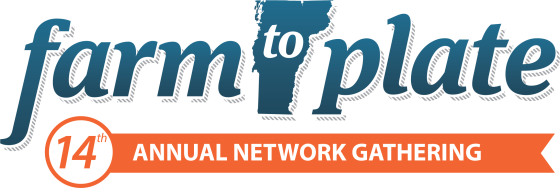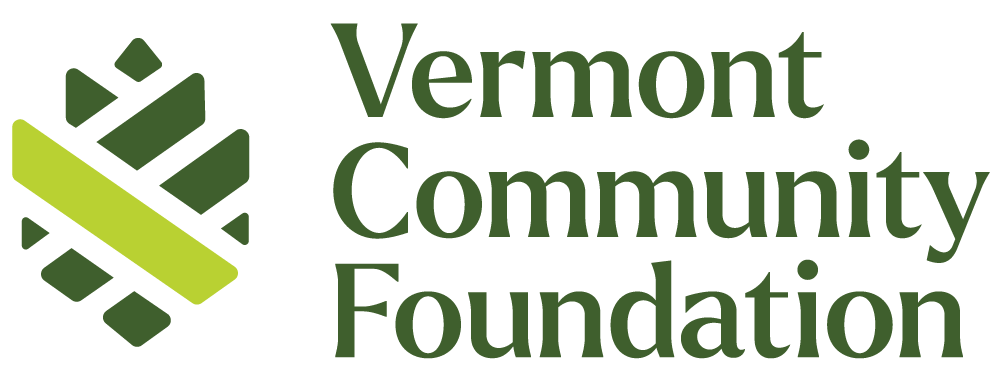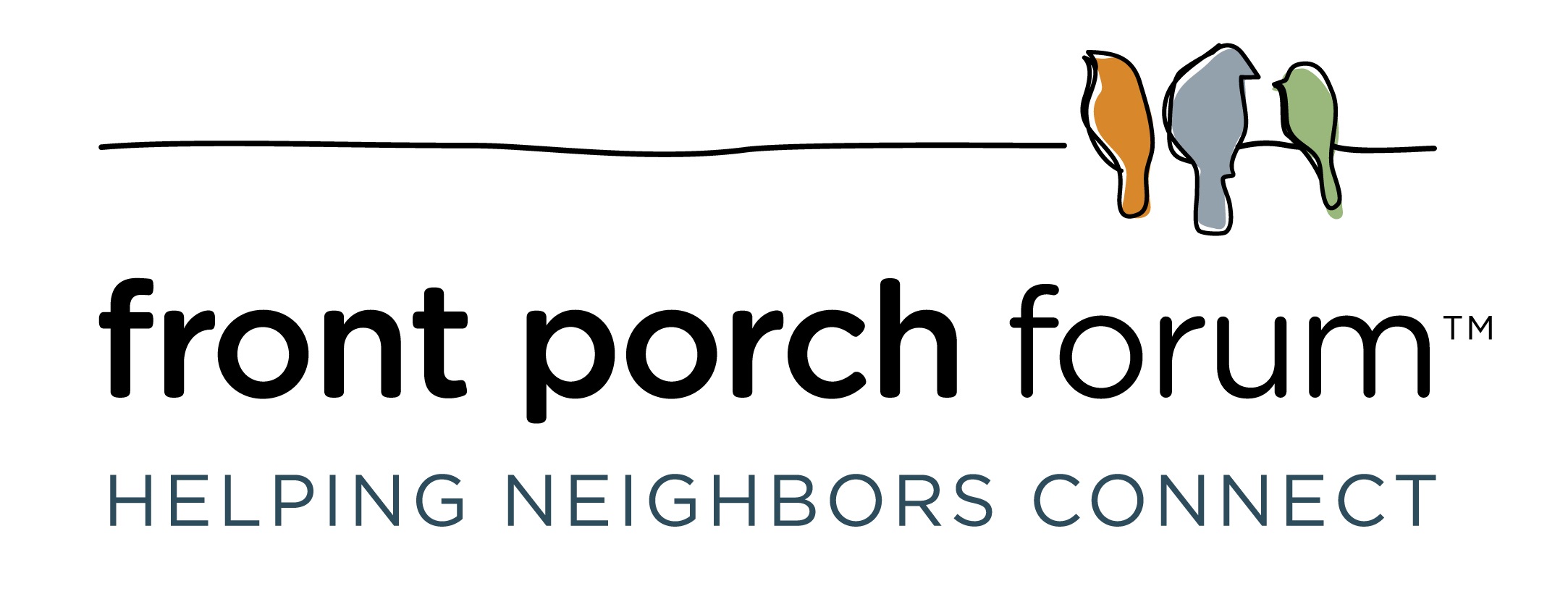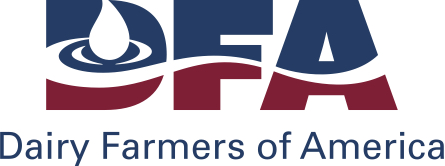14th Annual Farm to Plate Gathering

Killington Grand Resort
228 E Mountain Road
Killington, VT 05751
United States
Thank You for Attending the 14th Annual Network Gathering!
The Annual Farm to Plate Network Gathering brought together over 300 attendees from across Vermont’s food system. Over two days together, we built on last year's Gathering theme of "Transformative Change,” and explored what it means to take transformative, collaborative action within the food system.
The theme of this year's Gathering was "Transformative Action". The agenda included plenary storytelling, breakout sessions, meals, and time for connection with colleagues old and new. Interactive breakout sessions provided a mix of skill development and deep dives into food system topics and projects.
Watch the Opening Remarks
Wednesday Storytelling
Innovation Grows out of a Northwest Border Town
Ensuring access to food is not a task that can be tackled in isolation, nor does it always follow traditional paths—it thrives through innovative partnerships and a shared commitment to the well-being of all. The health of our Northwest Vermont community reflects the strength of our collaborations and the work we do together.
Learn what’s behind the partnership between the Northern Tier Center for Health (NOTCH) and Healthy Roots Collaborative that has cultivated an extensive network of regional relationships and developed programming that continues to innovate and grow to meet the needs of the community it serves.
Storytellers: Christine Porcaro, Supervisor, Healthy Roots Collaborative; Miranda Henry, Community Services Manager, Northern Tier Center for Health
CRAFT - Learning Through Interdisciplinary Partnership
When you were a high school student, did you have the opportunity to use a National Park as your ongoing learning lab? Were you able to make meaning across disciplines and follow your curiosities through independent learning and internships? Hear from two students and two educators with the Woodstock Union High School's CRAFT (Community and Climate Resilience through Agriculture, Forestry, and Technology) program about how this approach has shaped their current educational experience and future aspirations.
Storytellers: Kat Robbins, Place-Based Learning Coordinator; Abbie Castriotta, WUHSMS Gardens and Greenhouses Manager; Luca Morris, 12th grade CRAFT student; Edwin Lynds, 12th grade CRAFT student
From Cartons to Community: The Power of Organic Milk in Schools
Discover the story behind a groundbreaking partnership between Miller Farm in Vernon, VT and Windham Northeast Supervisory Union, where innovative thinking and shared values are bringing fresh, organic milk to local schools. Farmer Pete Miller and School Nutrition Director Harley Sterling share how this collaboration is reducing waste, supporting local agriculture, and reshaping the future of school nutrition.
Storytellers: Harley Sterling, School Nutrition Director, Windham Northeast Supervisory Union; Pete Miller, Organic Dairy Farmer and Processor, Miller Family Farm in Vernon, VT
View Session Slide Decks
*Not all sessions had slide decks to share
Session Title | Facilitator(s) | Session Description | Materials |
| Crafting Policies that Facilitate Land Access for Farmers | Lead Facilitator: Caroline Sherman-Gordon, Legislative Director, Rural Vermont Co-Facilitators: Grace Oedel; Nikki Lennart; Jean Hamilton; Graham Unangst-Rufenacht; Samantha Langevin | This interactive session explored policy ideas to improve land access for farmers and make farmland more affordable, while preventing corporate or institutional control. Attendees brainstormed solutions to the challenges of unaffordable farmland and discussed policies for farmland conservation, land use planning, farm succession, and shared leadership models. | Slide Deck |
| Tell Your Advocacy Story with the Food Security Roadmap | Lead Facilitator: Amy Shollenberger Co-Facilitator: Carlin Molander | This skills-building workshop taught participants how to tell their advocacy story using messaging tied to the Food Security Roadmap. Attendees learned to incorporate key talking points into discussions, integrate their lived experiences, and use advocacy tools to communicate effectively with legislators and stakeholders, preparing them to advocate effectively for any issue. | Slide Deck |
| Agroforestry Through the Lens of Biodiversity | Lead Facilitator: Julie Michaelson Co-Facilitators: Sabra Ewing; Juan Alvez, Ph.D. ; Jennifer Byrne | This session explored the biodiversity conservation potential of agroforestry in Vermont, viewing conservation, agriculture, and education as interconnected. Participants discussed pathways to productivity and sustainability, identified research gaps and social opportunities, how to optimize agroforestry design for biodiversity, and learned how agroforestry can transform agricultural productivity and create educational opportunities. | Slide Deck |
| Come Se Dice? Je Ne Comprends Pas! Language Barriers to Accessing Food System Resources | Lead Facilitator: Mariana Lamaison Sears Co-Facilitators: Johanna Doren; Naomi Wolcott-MacCausland | This session explored the barriers New Vermonters face in accessing food, programs, and services due to language and cultural challenges. Participants engaged in interactive role-playing to navigate food access in a non-English language. The session highlighted the efforts of direct service providers in tackling language access issues, explored potential solutions, and presented practical ideas to reduce language barriers. | Slide Deck |
| Food Hubs: Blurring the line between the charitable and commercial food system | Co-Facilitators: Lindsey Berk; Heidi Lynch; Christine Porcaro | This session explored the role of newly established food hubs in western Vermont—ACORN Food Hub, Healthy Roots, and Vermont Farmers Food Center—in supporting agriculture, food access, food sovereignty, and community. Topics included current services and future possibilities for these hubs beyond food aggregation, storage, and distribution. Attendees identified gaps in local food availability, and brainstormed transformative actions to better integrate local food into communities. |
Wednesday Sessions | 2:15 - 3:45p
Meeting Our Supply Chain Investment Needs
Session Type: Deep Dive | Goal Category: Sustainable Economic Development
Supply chain disruptions caused by Covid-19 and climate change, and recent research by New England Feeding New England have brought greater attention to regional supply chain development needs. In Vermont, these events have coincided with considerable change in our agricultural sector. While the dairy industry is undergoing transition and evolution, other industries such as meat, maple, produce, grains, and specialty foods are experiencing growth, innovation, and challenges of their own. A major barrier to diversifying our agricultural sector, building regional supply chain resilience, and enhancing farm viability is the lack of appropriate scale infrastructure to store, process, transport, and market higher volumes of locally grown food. In this session, using examples and data of supply chain development happening across different agricultural industries in the state, we’ll tease out lessons learned, required investment, differences to viability across industries, and identify actions we can take to meet our supply chain investment needs.
Lead Facilitator: Jake Claro, Farm to Plate Director
Co-Facilitators: Bruce Hennessey, Owner, Maple Wind Farm; Jennifer Porter, Agriculture Resource Navigator, VAAFM; Trevor Lowell, Assistant Director, VAAFM
Crafting Policies that Facilitate Land Access for Farmers
Session Type: Deep Dive | Goal Category: Environmental Sustainability
This interactive session is designed to explore policy ideas that would facilitate land access for farmers and make farmland more affordable, without corporate or institutional domination. In this brainstorming session, attendees will receive prompts about what’s at stake when farmers can’t afford farmland. After a breakout session, the whole group will capture and discuss policy ideas that could change the trajectory of farmland conservation, land use planning, farm succession and shared leadership models.
Lead Facilitator: Caroline Sherman-Gordon, Legislative Director, Rural Vermont
Co-Facilitators: Grace Oedel, Executive Director, NOFA-VT; Nikki Lennart, Farm Business Specialist, Intervale Center; Jean Hamilton, Director of Program Development, Land Access and Opportunity Board; Graham Unangst-Rufenacht, Policy Director, Rural Vermont; Samantha Langevin, Director of Partnerships & Community, VT Releaf Collective
A Good IDEA – Creating and Sustaining Organizational Change Rooted in Inclusion, Diversity, Equity & Accountability
Session Type: Skill Building | Goal Category: Racial Equity
Since 2020, many organizations have publicly stated DEI goals, but what does genuine organizational change toward diversity, equity, and inclusion look like? This session invites participants to share experiences and strategies for fostering and sustaining racial equity in the food system. Hosted by the Farm to Plate (F2P) Racial Equity Priority Strategy Team (PST) and the Vermont Agency of Agriculture, Food & Markets (VAAFM) IDEA group, this session will offer a collaborative space for those committed to racial equity action. Additionally, it will lay the foundation for a community of practice supported through the F2P Racial Equity PST, providing opportunities for continued engagement beyond the session.
Co-Facilitators: Emilie Inoue, VAAFM IDEA Team Member; Gina Clithero, VAAFM IDEA Team Member; Noah Gilbert-Fuller, VAAFM IDEA Team Member; Katie Spring, VAAFM IDEA Team Member; Ernesto Mendez, F2P Racial Equity PST Co-Curator; Anore Horton, F2P Racial Equity PST Co-Curator, Tatiana Abatemarco, Consultant
"Nothing About Us, Without Us..." Engaging Communities in Food Security Advocacy
Session Type: Skill Building | Goal Category: Healthy Local Food
This session will explore how Hunger Free Vermont’s Council Network has been an integral piece of shaping the VT Farm to Plate Food Security Roadmap to 2035. Council participants will share their experiences participating in these spaces, how their communities have engaged with the Roadmap over the course of the year through various planning activities, tapping into the vast array of local expertise within their communities. We will highlight the importance of maintaining various community perspectives in coalition development and how it leaves lasting, innovative impacts within the Food Security space – ultimately advancing our vision of a future where all Vermonters are food secure. Attendees will leave with concrete examples of community-driven organizing and opportunities for collaboration. Additionally, we’ll provide an update on Hunger Free Vermont’s efforts to embed equitable practices within the Council network and how this connects to the broader roadmap planning over the next decade.
Lead Facilitators: Lechelle-Antonia Gray, Coalition Development Lead, Hunger Free VT; Rosaline Pillay, Director of Community Engagement, Hunger Free VT
Co-Facilitators: Susan Grabowski, Food Program Coordinator, Windham Council Chair; Amy Scott, Food Program Manager, BROC Community Action Center, Rutland Council Chair
Tell Your Advocacy Story with the Food Security Roadmap
Session Type: Skill Building | Goal Category: Healthy Local Food
Action Circles’ skills building workshop will introduce participants to telling their advocacy story while using messaging connected to the Food Security Roadmap. Participants will learn how to use message frames and integrate key talking points about the Food Security Roadmap into any meeting or discussion. Additionally, participants will learn how to interweave their lived experience with proven advocacy tools to effectively communicate with legislators and other stakeholders. Through breakout sessions and group discussions, participants will have the opportunity to practice these skills and receive immediate feedback. By the end of the session, participants will be able to effectively advocate for any issue, but especially those connected to the Food Security Roadmap.
Lead Facilitator: Amy Shollenberger; Owner, Action Circles
Co-Facilitator: Carlin Molander; Legislative Operations Manager, Action Circles
The Sustainability Paradox: Experiences from farmers in Vermont
Session Type: Deep Dive | Goal Category: Environmental Sustainability
Farmers are dealing with increasing ecological, social, and economic challenges to sustainability. They are questioning whether sustainability is possible in the context of deepening crises, like climate change. They lack control over many of the most pressing challenges, which arise out of system issues, rather than individual farm practices.
In this open discussion centered around farmers’ experiences, we will explore how to reframe the concept of sustainability to advance systemic change that honors the many contributions to ecosystem and societal health that small and medium scale farms make. Participants will leave with a greater understanding and empathy for the challenges facing farmers and food systems, while increasing solidarity in advocating for impactful social and policy transformation.
This session is informed by the UVM Food Systems Research Center’s “Sustainability Metrics” research, which focuses on consumer-facing farms.
Lead Facilitator: Josiah Taylor, PhD, UVM Food Systems Research Center
Co-Facilitators: Shiva Soroushnia, PhD student UVM Food Systems; David Conner, UVM Community Development and Applied Economics Professor; Lisa Chase, UVM Extension Professor; Mari Omland, Green Mountain Girls Farm; Jon Cohen, Deep Meadow Farm
Thursday Sessions | 9:15 - 10:45a
Eusociality - Using Insect Sociobiology to Evaluate How and Why to Cooperate for Improved Community Resilience & Effective Food System Strategy
Session Type: Deep Dive | Goal Category: Environmental Sustainability
In this session, we’ll explore lessons from eusocial organisms, like the European Honey Bee, upon which our dominant industrial agricultural system depends, to inspire more cooperative, collective action in food system transformation. Through a brief introduction to eusociality, participants will reflect on where their work falls on the sociality spectrum and how they can better align efforts for greater impact. Small group discussions will focus on barriers and opportunities for increased collaboration within the food system. Participants will leave with insights and strategies for fostering cooperation and strengthening collective efforts. By drawing inspiration from nature, we’ll challenge assumptions and deepen connections across the food system.
Co-Facilitators: Nissa Coit, Learning Commons Steward, EcoGather; Nicole Civita, Network Weaver and Creative Collaboration Director, EcoGather
How Business/Resource Navigators Complement Business TA and Financial Capital Providers, and Why We Need Many More of Them in VT
Session Type: Deep Dive | Goal Category: Racial Equity
Business/Resource Navigators enhance the inclusivity, social equity, and impact of financing programs that aim to make it easier for BIPOC entrepreneurs and farmers to get money. When rooted in the communities they serve, Navigators are able to build relationships that go beyond one-time transactions. They serve as a bridge between financial bureaucracy and the needs of regular people. They often show up with lived experience that are key to the creation of inclusive financial systems.
After hearing from Navigators, we’ll explore how their use should be expanded. We’ll foster dialogue, harvest group insights, and stimulate innovation along the way–emphasizing how each participant can have the most direct impact in calling attention to the model and why it works. Ultimately, we all can be catalysts in expanding the use and funding of Navigators across the VT food system.
Navigator Definition
Navigators help farmers and entrepreneurs in their journey to access land and money. Empowering the farmer/entrepreneur allows them to be aware of, and access, financing that fits their needs. Navigators provide mentorship and resources. They help assess readiness and offer support to help farmers and entrepreneurs reach their goals. They provide practical solutions for people trying to navigate an unfamiliar business landscape.
Lead Facilitator: Eric DeLuca, Principle, Leverage Point Consulting
Co-Facilitators: Jennifer Morton, Technical Assistance & Resource Manager, VT Releaf Collective; Samantha Langevin, Director of Partnerships & Community, VT Releaf Collective; Ben Green, Business Navigator and Resource Manager, Vermont Community Loan Fund; Curtiss Reed, Jr., Executive Director, Vermont Partnership for Fairness and Diversity; Lechelle-Antonia Gray, Coalition Development Lead, Hunger Free VT
What Makes Farms Climate Resilient? Part 1: Keys to Building Adaptive Capacity
Session Type: Deep Dive | Goal Category: Environmental Sustainability
From water and drought management to extreme heat and unseasonal frosts, to crop insurance and unstable markets, Vermont needs transformational systems changes to support farms in adapting to an increasingly unpredictable and unforgiving climate. In this session we'll learn about evolving resources and programs that build adaptive capacity and support farm resilience in Vermont. Together we'll map out existing resources, programs, and partnerships that support resilience, discuss efforts that need to be strengthened, identify what's missing, and cultivate new connections and coordination. This session is geared for experienced and new voices alike, with an emphasis on identifying some real and actionable steps to make farms climate resilient. This session is part 1 of a two-part series on climate resilience.
Lead Facilitator: Alissa White, New England Deputy Director at American Farmland Trust
Co-Facilitators: Sara Waring, Rural Development State Director VT/NH, USDA; Jake Jacobs, Risk Management Outreach and Farm Teams Coordinator, White River Natural Resource Conservation District; Sam Smith, Director of VT Farm Business Services at the Intervale Center; Eric Boatti, Climate Resilience Specialist, NOFA Vermont; Ryan Patch, Agriculture Climate and Land Use Manager, VAAFM, Jamie Pottern, New England Program Manager, American Farmland Trust
Agroforestry Through the Lens of Biodiversity
Session Type: Deep Dive | Goal Category: Environmental Sustainability
In this session, we will dive deep into the biodiversity conservation opportunities of agroforestry in Vermont and provide participants with a framework for thinking about the future of conservation, agriculture, and education in Vermont as one and the same. While exploring common routes to productivity and sustainability with participants, we will compile resources and discuss the research gaps and social opportunities for agroforestry practices. Participants will come away with specific knowledge to optimize agroforestry design for biodiversity and how it may transform agricultural productivity and create educational opportunities in Vermont.
Lead Facilitator: Julie Michaelson, Pollinator Conservation Specialist, Xerces Society, Partner Biologist, NRCS
Co-Facilitators: Sabra Ewing, President & Founder, VerShare, President, Flag Hill Farm, Shepherd, WereWool, Farmer; Juan Alvez, Ph.D., Research Associate Faculty, University of Vermont Extension; Jennifer Byrne, District Manager with the White River Natural Resources Conservation District
Supply Chain Facilitation that Centers Farm & Farm Worker Needs
Session Type: Deep Dive | Goal Category: Sustainable Economic Development
The supply chains of our day, shaped by corporate consolidation and corporate interests, largely fail to meet the needs and values of Vermont farmers and farmworkers. To foster real Vermont farm viability and food security, and to do so with social and environmental integrity, we need to transform our supply chains by centering farmer and farmworker needs. This session will be comprised of two parts:
1) A brief panel, spotlighting recent inspiring examples of farmer- and farmworker-centered supply chain innovation.
2) An interactive discussion of two critical questions: What’s getting in the way of supply chain innovation that centers farmer and farmworker needs? And what are we going to do about it?
Lead Facilitator: Lauren Griswold, Wholesale Markets Program Director, NOFA-VT
Co-Facilitator(s): Kayla Strom, Farm to School Program Manager, NOFA-VT; Will Lambek, Migrant Justice; Marita Canedo, Migrant Justice; Richard Berkfield, Executive Director, Food Connects; Olga Moriarty, Executive Director, Northeast Organic Family Farm Partnership
Thursday Sessions | 11:00a- 12:30p
What Makes Farms Climate Resilient? Part 2: Farming, Flooding, and Reforming for an Equitable, Food Secure Future
Session Type: Deep Dive | Goal Category: Environmental Sustainability
To ensure that our farms are able to keep people, land, and communities healthy and food secure, we must work together to implement long term, structural change that addresses the inequity at the heart of food insecurity and climate change. This session features insights and firsthand experiences from farmers on the frontline of climate change on climate adaptation and resilience. Participants will take this learning into creative visioning exercises and small group discussions to identify strategies grounded in transformative action, within the framework of the Farm to Plate Strategic Plan and Food Security Roadmap. Together, we will explore ways to expand equitable opportunities for all to contribute to a food-secure and climate-resilient future. Attendees will leave equipped with tools to drive meaningful change in their communities. This session is part 2 of a two-part series on climate resilience.
Lead Facilitator: Maddie Kempner, NOFA-VT Policy & Organizing Director
Co-Facilitators: Bill Cavanaugh, Farm business advisor, NOFA-VT; Kara Fitzbeauchamp, Evening Song Farm; Bruce Hennessey, Owner, Maple Wind Farm; Tucker Andrews, (Co)Owner, Bone Mountain Farm / The Farm Upstream
Vermont-based Food and Fiber – Increasing Diversified Farm and Market Opportunities
Session Type: Deep Dive | Goal Category: Sustainable Economic Development
If we are to address our climate crisis and conserve prime agricultural soils for more local and regional food production, it is critical that we help farms become more sustainable and profitable. This session explores natural fiber production as a diversification strategy for farms that produce food. Attendees will learn about the growing interest in natural fiber production in our region, explore the synergies between growing animal and plant-based food and fiber, and identify common supply chain challenges and shared opportunities for increasing the number of sustainable, profitable agricultural ventures in Vermont. Attendees will interact with various animal and plant-based fibers grown in Vermont and see examples of finished products that feed consumer demand. Attendees contribute to valuable market research that begins to identify specific, shared supply chain bottlenecks that can be addressed.
Lead Facilitator: Christine McGowan, Program Director, VSJF
Co-Facilitator(s): Andrea Myklebust Sears; Laura Sullivan, University of Vermont Extension; Janet Currie, Valley Stock Farms and Vilhemp USA; Kelly Nottermann, Sheep Farmer, Snug Valley Farm; Amanda Kievet, Co-Owner, Junction Fiber Mill; Dave Martin – Farmer, Settlement Farm/Vermont Sheep and Goat Association
Create a Marketing Communications Strategy and Plan for Your Next Big Initiative
Session Type: Skill-Building | Goal Category: Sustainable Economic Development
This interactive skill-building session aims to help farms and food businesses reach new customers through effective marketing. Please come with a specific initiative or organizational goal in mind so you can make the most of the session. Participants will create a tailored communications strategy for upcoming initiatives, such as a fundraising campaign, product launches, or a package or website redesign. The session will begin with a presentation on the process, followed by small group discussions. Attendees will leave with a focused communications plan, the top three messages for their audience, and a strategy for selecting effective communication channels. Additionally, participants will engage in "hot seat" coaching to refine their individual marketing plans, ensuring actionable takeaways for immediate implementation.
Lead Facilitator: Becca Brown, Uppercase Industries, Founder & CEO
Come Se Dice? Je Ne Comprends Pas! Language Barriers to Accessing Food System Resources
Session Type: Deep Dive | Goal Category: Racial Equity
Join us to gain an understanding of the barriers that New Vermonters across immigration status face to access food, programs, resources and services, by testing your language skills and cultural competencies. All without getting lost in translation!
This session will start with interactive role playing! A scenario will be presented for participants to figure out how to navigate accessing food in a language that is NOT English. Next, we'll showcase the work that various direct service providers are doing to understand and tackle the challenges around language access in our state. The session will end with dialogue around potential solutions and participants' sharing challenges, questions and ideas around the topic. Bring your sense of humor and your favorite translation app! Experience a bit of how speakers of other languages feel in Vermont and takeaway ideas to bring down language barriers in your own work world.
Lead Facilitator: Mariana Lamaison Sears, Outreach Lead, Hunger Free Vermont
Co-Facilitators: Johanna Doren, Direct Markets & Local Food Access Program Director, NOFA VT; Naomi Wolcott-MacCausland, Migrant Health Program Coordinator, University of Vermont Extension
Food Hubs: Blurring the line between the charitable and commercial food system
Session Type: Deep Dive | Goal Category: Sustainable Economic Development
The ACORN Food Hub, Healthy Roots and Vermont Farmers Food Center are newly established food hubs in western Vermont that serve the intersection of agriculture, food access, food sovereignty, and community. As we discuss what services these new “food hub” spaces might offer in the future, we will facilitate a session for folks from across the food system. Together, we’ll explore: What is happening now & what could be happening beyond the physical aggregation, storage, and distribution of food that food hubs currently offer. We’ll work together to analyze tangible ways our food hubs, and our communities, can contribute to transformative action via transforming how we look at, and act within, the food system. This session looks to build community, socially locate ourselves in the local food system to inspire action on a local or regional level, identify gaps where local food is not available, and reimagine ways of getting local food to spaces where it’s currently unavailable.
Co-Facilitators: Lindsey Berk, Executive Director, ACORN Food Hub; Heidi Lynch, Executive Director, Vermont Farmers Food Center; Christine Porcaro, Healthy Roots Collaborative Supervisor, Healthy Roots Collaborative
Plans, Roadmaps, Inventories... Oh My
Session Type: Deep Dive | Goal Category: All
Vermont has many statewide plans aiming to transform the food system! How do they relate- or do they relate at all? Who is in charge? Are they on a dusty shelf? What is "30x30" ? Join us for a fun, interactive exploration of the Plans and Roadmaps currently guiding Farm to Plate and its related networks and coalitions. Plans will include but are not limited to: the Agriculture and Food System Strategic Plan, the Conservation Inventory, the Climate Action Plan, and the Food Security Roadmap. You will leave ready to amaze your colleagues with your new knowledge, and, even better, a useful understanding of your work’s connections to partners across the state.
Lead Facilitator: Becka Warren, Farm to Plate Food Security Coalition Manager
Co-Facilitator(s): Jake Claro, Farm to Plate Director; Stacy Cibula, Agricultural Program Director Vermont Housing & Conservation Board; Ryan Patch, Agriculture Climate and Land Use Policy Manager, Vermont Agency of Agriculture, Food & Markets; Alissa White, New England Deputy Director at American Farmland Trust
Thank you, 2024 Sponsors!
Farm Level Sponsors:

Dairy Level Sponsors:





